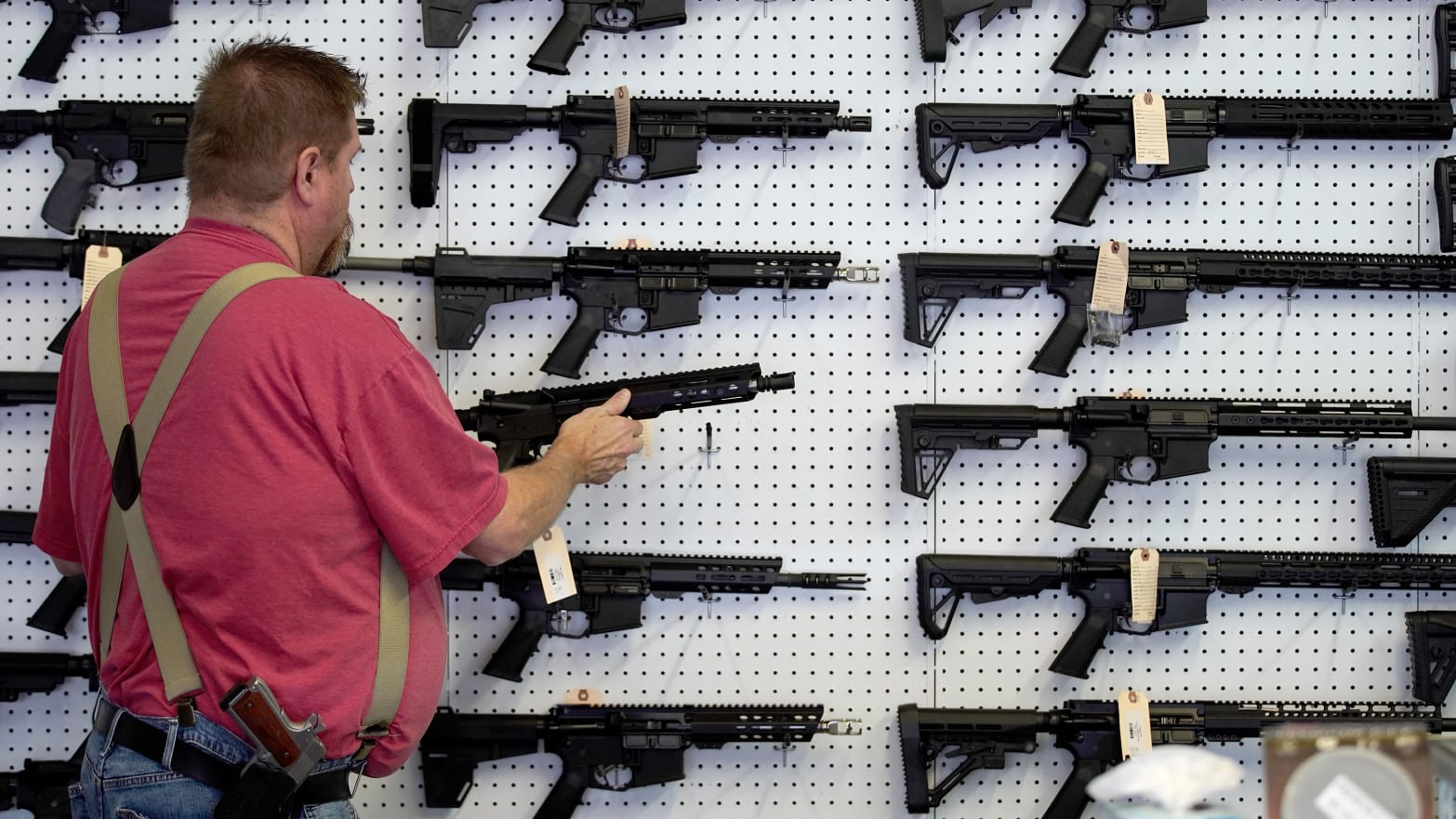Since the devastating massacre of children last month at an elementary school in Uvalde, Texas, there have been glimmers that some Republicans might break the party’s long-held, nearly universal blockade of gun safety reforms.
Last week, 10 GOP senators lent their names in support of a compromise deal that is likely to include meaningful gun reforms. And five House Republicans voted in favor of a far more sweeping, Democrat-authored bill that passed the chamber last week.
But among the Republicans with arguably the greatest power to effect change in gun policy—state governors—there have been no such glimmers.
Instead, in the last month, many GOP governors have rejected calls to consider state-level gun violence prevention measures, redirected focus to discussions of “school safety” or mental health, or, in some cases, doubled down on an unequivocal opposition to any gun restrictions.
Several of these governors are up for re-election this year, and the murders in Uvalde—as well as recent mass shootings elsewhere like Buffalo, New York—have put gun violence back on the national agenda in a way it has not been in years.
In battleground states like Georgia, New Hampshire, Ohio, and others, GOP governors have indicated clearly they have no desire to even entertain an election-year push on gun reform—even if their states have relatively high levels of public support for strengthening gun safety laws.
In Georgia, Gov. Brian Kemp is fresh off campaigning in a primary in part on his law to allow people to publicly carry firearms without a permit. An Atlanta Journal-Constitution poll found that nearly 70 percent of Georgia voters disapprove of that proposal.
Since Uvalde, Kemp has stiff-armed any discussion of reforming the state’s gun laws, emphasizing school security and mental health. His lieutenant governor, Geoff Duncan, struck a different note, saying it’s time for “a conservative and comprehensive conversation about changing the trajectory of gun violence.”
At least one governor, Mike DeWine of Ohio, has responded to persistent cries to “do something” on gun violence in his state—it’s just not something that any gun safety advocate wants to see.
DeWine, who pledged in 2019 to act on gun violence after a deadly mass shooting in Dayton, Ohio, signed a bill last week that would drastically reduce the training required for teachers to carry a firearm in the classroom.
Previously, Ohio teachers needed to complete 700 hours of training to carry a gun to school. The bill DeWine signed cuts it to just 24 hours. Republicans argued this was the best possible measure to prevent another school shooting, even though there is scant evidence that arming teachers makes for safer schools.
By contrast, Democratic governors facing tough re-elections have leaned into pushing for stronger gun reforms. In Minnesota, Michigan, and Wisconsin, Democratic governors Tim Walz, Gretchen Whitmer, and Tony Evers all urged their state legislatures to take up gun violence prevention measures.
On June 1, Connecticut Gov. Ned Lamont—who could potentially face a real GOP challenge in November—signed into law an expansion of the state’s already-strong red flag law, a version of which the Senate group is trying to advance right now.
Democratic challengers are also targeting GOP incumbents on guns. Stacey Abrams, who is in a rematch with Kemp in Georgia, rolled out a gun violence prevention plan last week. Nan Whaley—the mayor of Dayton, Ohio—is running against DeWine and has also hit him frequently on his gun plans.
Democrats are hoping Republican governors’ inaction on gun violence will be a liability for them this year—and perhaps pave the way for Democratic challengers who might implement stronger measures if elected.
“It’s an issue that hits close to home and it’s an issue that has the power to swing suburban voters back,” said Jared Leopold, a Democratic strategist who formerly worked at the party’s official arm for governors’ races.
“The majority of Americans across party lines want to see some action, and they expect their governors to try to act,” Leopold continued. “But the Republican Party is so beholden to the gun-toting right-wing base that someone like Brian Kemp is terrified of even taking one moderate step on gun control.”
Indeed, though a small minority of Republican elected officials have been willing to entertain modest gun reforms, it remains the case that even starting down that road is a toxic move with GOP base voters. Facing highly favorable political conditions in this 2022 midterm, most Republicans seem to see no real incentive to engage on an issue that could lose them needed votes in November.
Some of those Republicans have already faced political consequences: Rep. Chris Jacobs’ (R-N.Y.) decision to come out in favor of gun reforms caused such a backlash among conservatives that he decided not to run for re-election this year.
On Friday, Sen. John Cornyn (R-TX), who is the lead Senate Republican negotiator of the compromise package, was booed so heartily by attendees of Texas Republicans’ annual convention that it was impossible to hear him, according to reports.
The archconservative governor of Texas, Greg Abbott, has at least expressed openness to reforming the state’s gun laws after past mass shootings in his state. But he made no such comments since Uvalde, with his re-election campaign in full swing.
Abbott faces Beto O’Rourke, the former El Paso congressman and presidential candidate. The day after the shooting in Uvalde, O’Rourke traveled to the town to confront Abbott in front of the cameras during a press conference.
“This is on you,” O’Rourke said to Abbott, before being escorted out by security.
The first poll of the race since the Uvalde shooting was released on Wednesday by Quinnipiac University, and it shows a tightening race between the two: Abbott leads O’Rourke by five points. That poll found 38 percent of Texas voters approving of Abbott’s handling of gun violence issues.
In his responses to Uvalde, Abbott has proposed just about everything besides reconsidering Texas gun laws. In a Wednesday letter to the legislature requesting a special session focused on school shootings, Abbott said they should focus on “school safety,” “mental health,” “social media,” “police training,” and “firearm safety.”
O’Rourke, who has made a name for himself in Texas—not always to his benefit—for his staunch opposition to state and federal gun laws, is poised to make Abbott’s handling of gun policy a key issue in his campaign. “Let’s vote him out and save lives,” O’Rourke tweeted on Thursday, the latest of many messages attacking Abbott on the subject.
It’s not just in gun-loving Texas where a GOP governor has rejected reconsideration of gun laws. In purple New Hampshire—which reliably sends pro-gun control Democrats to Congress—GOP Gov. Chris Sununu is heavily favored to win another term in office.
Sununu, who is generally considered a moderate in today’s Republican Party, has been even more explicit in rejecting gun reform after Uvalde than Kemp and Abbott. “We’re not looking to make any changes,” Sununu said at a press conference on June 1.
Leopold, the Democratic strategist, said that gun reforms—along with abortion, the country’s biggest cultural wedge issue—could be a potent motivating factor in this year’s midterms. Democrats and President Joe Biden face grim poll numbers. But Republican inaction on gun violence or protecting abortion rights could motivate liberal and independent voters to show up for Democrats.
“People vote on their anger, especially in a midterm,” Leopold said. “These social issues like guns and abortion can rile people up, rightfully so, and get them to the polls.”

